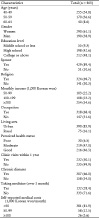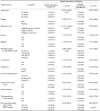References
1. Shin NM, Choi J, Cho I, Park BJ. Self-management program for heart healthy behavior among middle- and old-aged Korean women at risk for metabolic syndrome. J Cardiovasc Nurs 2017;03. 17. [Epub ahead of print].
4. Jessup RL, Osborne RH, Beauchamp A, Bourne A. Health literacy of recently hospitalised patients: a cross-sectional survey using the Health Literacy Questionnaire(HLQ). BMC Health Serv Res 2017;17(1):52.
5. Bakker CJ, Koffel JB, Theis-Mahon NR. Measuring the health literacy of the Upper Midwest. J Med Libr Assoc 2017;105(1):34–43.
6. Chon BS, Lee JG. A study on dispositional use motives for facebook and its positive and negative effects: with a focus on changes to interpersonal networks on facebook and facebook addiction among users in the age groups of 2039 and 4059. Speech Commun 2014;24:112–140.
7. Dutta-Bergman MJ. Primary sources of health information: Comparisons in the domain of health attitudes, health cognitions, and health behaviors. Health Commun 2004;16(3):273–288.
8. Basu A, Dutta MJ. The relationship between health information seeking and community participation: the roles of health information orientation and efficacy. Health Commun 2008;23(1):70–79.
9. Howell JL, Shepperd JA. Reducing information avoidance through affirmation. Psychol Sci 2012;23(2):141–145.
10. McQueen A, Vernon SW, Swank PR. Construct definition and scale development for defensive information processing: an application to colorectal cancer screening. Health Psychol 2013;32(2):190–202.
11. DuBenske LL, Burke Beckjord E, Hawkins RP, Gustafson DH. Psychometric evaluation of the health information orientation scale: a brief measure for assessing health information engagement and apprehension. J health Psychol 2009;14(6):721–730.
12. Suziedelyte A. How does searching for health information on the Internet affect individuals' demand for health care services? Soc Sci Med 2012;75(10):1828–1835.
13. James DC, Harville C 2nd. eHealth literacy, online help-seeking hehavior, and willingness to participate in mHealth chronic disease research among African Americans, Florida, 2014-2015. Prev Chronic Dis 2016;13:E156.
14. Tan SS, Goonawardene N. Internet health information seeking and the patient-physician relationship: a systematic review. J Med Internet Res 2017;19(1):e9.
15. Son YJ, Song EK. Impact of health literacy on disease-related knowledge and adherence to self-care in patients with hypertension. J Korean Acad Fundam Nurs 2012;19(1):6–15.
16. Kim KJ, Lee IS. The influence of health information source credibility and e health literacy on health information orientation of parents of local hospitalized children. J Digit Converg 2016;14(6):295–307.
17. Park DJ, Kwon MS, Choi JH. The Influence of health information orientation, attitude of internet health information, and e-health literacy on personal health behaviors. J Public Relat Res 2013;17(3):379–413.
18. Feinberg I, Frijters J, Johnson-Lawrence V, Greenberg D, Nightingale E, Moodie C. Examining associations between health information seeking behavior and adult education status in the U.S.: an analysis of the 2012 PIAAC Data. PloS One 2016;11(2):e0148751.
19. Ojewola RW, Oridota ES, Balogun OS, Ogundare EO, Alabi TO. Lower urinary tract symptoms: prevalence, perceptions, and healthcare-seeking behavior amongst Nigerian men. World J Mens Health 2016;34(3):200–208.
20. Nölke L, Mensing M, Krämer A, Hornberg C. Sociodemographic and health-(care)related characteristics of online health information seekers: a cross-sectional German study. BMC Public Health 2015;15:31.
21. Miller SM. Monitoring and blunting: validation of a questionnaire to assess styles of information seeking under threat. J Pers Soc Psychol 1987;52(2):345–353.
22. Loiselle CG. Self-evaluation and health information-seeking: a study of self-assessment and self-protection motives [dissertation] Madison: University of Wisconsin; 1995. English.
23. McQueen A, Vernon SW, Swank PR. Construct definition and scale development for defensive information processing: an application to colorectal cancer screening. Health Psychol 2013;32(2):190–202.
24. Moon IO, Park SK, Kim EG. Influence on health promotion behavior among nursing students according to health information seeking behavior. J Korean Public Health Nurs 2015;29(2):231–243.
25. Fiksdal AS, Kumbamu A, Jadhav AS, Cocos C, Nelsen LA, Pathak J, et al. Evaluating the process of online health information searching: a qualitative approach to exploring consumer perspectives. J Med Internet Res 2014;16(10):e224.
26. Knapp C, Madden V, Wang H, Sloyer P, Shenkman E. Internet use and eHealth literacy of low-income parents whose children have special health care needs. J Med Internet Res 2011;13(3):e75.
27. Berkman ND, Davis TC, McCormack L. Health literacy: what is it? J Health Commun 2010;15Suppl 2. :9–19.
28. Lalazaryan A, Zare-Farashbandi , F . A review of models and theories of health information seeking behavior. Int J Health Syst Disaster Manage 2014;2(4):193–203.
29. McCloud RF, Jung M, Gray SW, Viswanath K. Class, race and ethnicity and information avoidance among cancer survivors. Br J Cancer 2013;108(10):1949–1956.
30. Burke KE, Schnittger R, O'Dea B, Buckley V, Wherton JP, Lawlor BA. Factors associated with perceived health in older adult Irish population. Aging Ment Health 2012;16(3):288–295.





